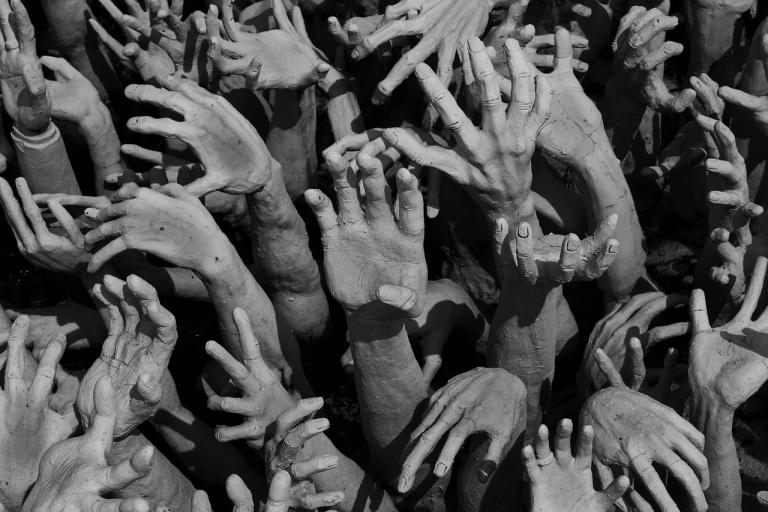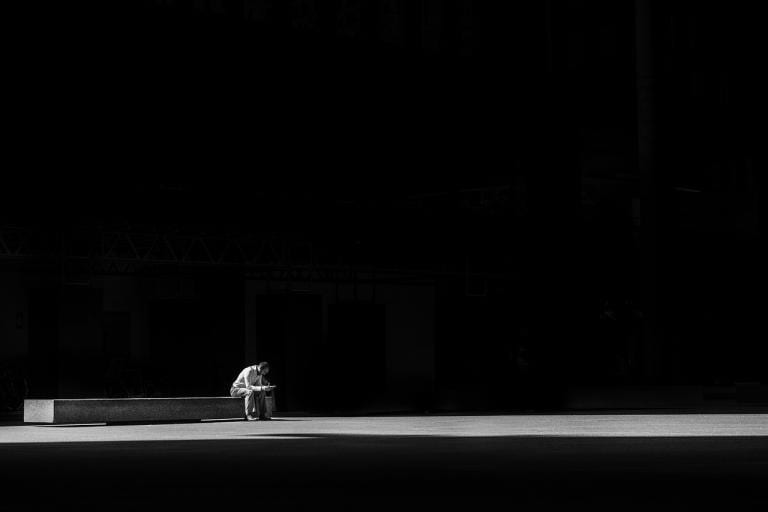Recently, I’ve been re-reading my book of philosophical dramas, Eros & Thanatos, and it’s got me thinking about the problems of Hell and mortal sin.
These are contentious issues, obviously. One of the most common objections to Christianity is that it seems unutterably horrid to think that a good, just and loving God would subject any of His creatures to suffer eternally. The most common contemporary answer to this is that God doesn’t actually damn anyone, that “the gates of hell are closed from the inside.” Basically, the soul refuses to receive God’s love and mercy and since God will not force anyone to be in His presence without their consent. The soul is left to its own devices for eternity.
This is basically the definition of Hell that is used by the Church: Hell is not so much a place, a physical location, so much as it is a state of being separated from God. The imagery traditionally associated with hell – all of the baroque tortures and picturesque lava lakes full of screaming naked people – are essentially symbolic representations of the soul’s anguish. Indeed, it’s not uncommon for people suffering from severe forms of mental or spiritual distress (depression, for example) to vividly imagine their pain taking various physical forms that are not dissimilar to the imagery of demons whipping you with chains or gnawing on your entails.
Alright, but this seems to assume that simply being left alone to do your thing is necessarily a state of anguish. Before I converted that would definitely have been a hard sell for me. Indeed, I liked to imagine that if there was an afterlife it would basically involve the mind being free to roam about inside the imagination for all eternity. Sounds fun, right?
Except that fantasy has its limitations. I’m a flawed and finite being, and a finite being cannot produce the kind of infinite interior resources necessary to provide for eternity. There’s a reason why it is not good for man to be alone. Nor would it be any better if we were allowed to associate with other, equally flawed and finite beings. Sartre’s play “No Exit” explores this possibility and concludes that “Hell is other people.” These things might seem appealing up front, and they might even be fun for a while, but ultimately they would become tedious and decline into a kind of eternal torment.
Hell, then, is simply the state of mind of a person who eternally rejects that joy that is offered to them in Heaven.
It may seem unlikely that anyone would actually choose this, but I’m not so sure. The reason why no Utopian project ever works on earth is, simply, that there is no Utopian scheme that can perfect the human heart. Any system that you make will involve evil, injustice and inequality for the simple reason that it will include human beings who are deceitful, manipulative, selfish, avaricious, hateful, resentful and proud. So long as those qualities persist in individual agents, they will necessarily emerge as any social system develops. This means that heaven demands that we must submit ourselves to the process of being perfected. And anyone who has ever seriously attempted virtue will tell you that trying to become perfect is both arduous and painful.
Heaven has to involve perfect people: Saints. And inversely, anyone who is not a saint will not find heaven to be especially heavenly. Many people have made the point that they find morally good people boring, that all of the interesting folks are the ones with colourful sins, and that life isn’t any fun if you’re not allowed to be at least a little bit bad. As cute as that sounds, it’s only true if on some level you think that it’s both acceptable and charming to hurt other people. Because that’s the essence of sin: you pursue your own good at the expense of others.
Heaven can’t work, even theoretically, if you give any space for that kind of mentality. As soon as a person thinks that they are better, more special, more important, more deserving of privilege, and more entitled to have their desires fulfilled than any other person, they no longer fit in. God, being perfect and also completely just, is not going to pander to that kind of egotism. And let’s face it: most of us are going to find that pretty difficult to handle on some level or other.
The person who clings to various disordered desires and inclinations will find the company of God and of the blessed to be intolerable. But they will no longer have the option to satisfy their desires or to exploit other people in order to achieve them. The person who is literally unwilling to just let it go will find him or herself in the position of Tantalos: their mind will eternally dangle the vision of their desires before them, but every time that they reach out to attain their goal, it will be removed by an insuperable distance.
The Communion of Saints also demands transparency and contrition. You can’t be in full loving union with another person if you have secrets from them – especially if those secrets involve ways that you hurt or betrayed them. If you did something wrong and it hurt someone else, it’s just not fair to expect that person to live eternally as part of one body with you while you continue to nurse the delusion that the way you treated them was okay.
Although most of us don’t like to think about it, the truth is we all have victims. Divine justice is not so much a matter of God demanding a pound of flesh for your transgressions, as it’s a matter of God demanding that you sit humbly through your own private truth and reconciliation trial, and that at the end you ask for mercy rather than making excuses. If you’re still indulging in self-justification or blame-shifting, you’re not ready to sit at table with the people you hurt. You’re welcome to go off and sulk for a bit until you’re prepared to say “I’m sorry” (purgatory), or you’re welcome to leave and continue nursing your sense of aggrieved entitlement for all eternity. What you are not welcome to do is subject others to your toxic narratives about why it was okay for you to be a bitch.
And we all have them. Let’s face it, this is one of the most harrowing truths about the final judgment: being in full communion with God and with others demands that we entirely submit our lives to the criteria of truth, goodness and beauty. There can be no more excuses and no more self-deception. The soul in this final adjudication sees her or his entire life as it actually was, not as he or she would have liked it to be.
And there is a risk, a very strong one I think, that many of us confronted with the truth about ourselves will just want to crawl away into a corner and die. Shame and guilt are the foundation of an awful lot of depression and anxiety, and if a person doesn’t ultimately have the humility to accept that they, too, were only a normal human being with normal human flaws then they might well, out of misplaced moral and spiritual pride, choose endless lamentation over mercy.
Incidentally, this is similar to the reason why the prostitutes and the tax collectors are getting into heaven ahead of the Pharisees. If you’re deeply convinced that actually you’re better than other people, even if you’ve cloaked that conviction in a veil of humility (because, you know, being humble makes you better than other people), you’re going to find heaven difficult to accept.
If you think that you’re virtuous and righteous, you’re going to stand there a long time, tapping your foot, wondering why nobody is rolling out the red carpet, seething with resentment that God is in there welcoming and embracing all these reprobates without even once reproving them for, say, praying in the orans posture during the Our Father or voting for Donald Trump. Theoretically, you might just stand there forever: too good to go in and mix with the rabble until they all agree to agree with you.
Mortal sin is, simply, the kind of sin that puts us at serious risk of rejecting Heaven. Specifically, it’s the kind of sin that a person must reject and turn away from before they will be capable of enjoying eternal communion with God and with humanity. These are the sins where you hurt someone badly enough that when they meet you in eternity they’re not going to just shrug and say, “meh, small beer.” And they are the sins where you’ve encouraged, within yourself, an attitude of superiority, contempt, hatred or callousness that is incompatible with perfect love.
Image credit: pixabay
Stay in touch! Like Catholic Authenticity on Facebook:













